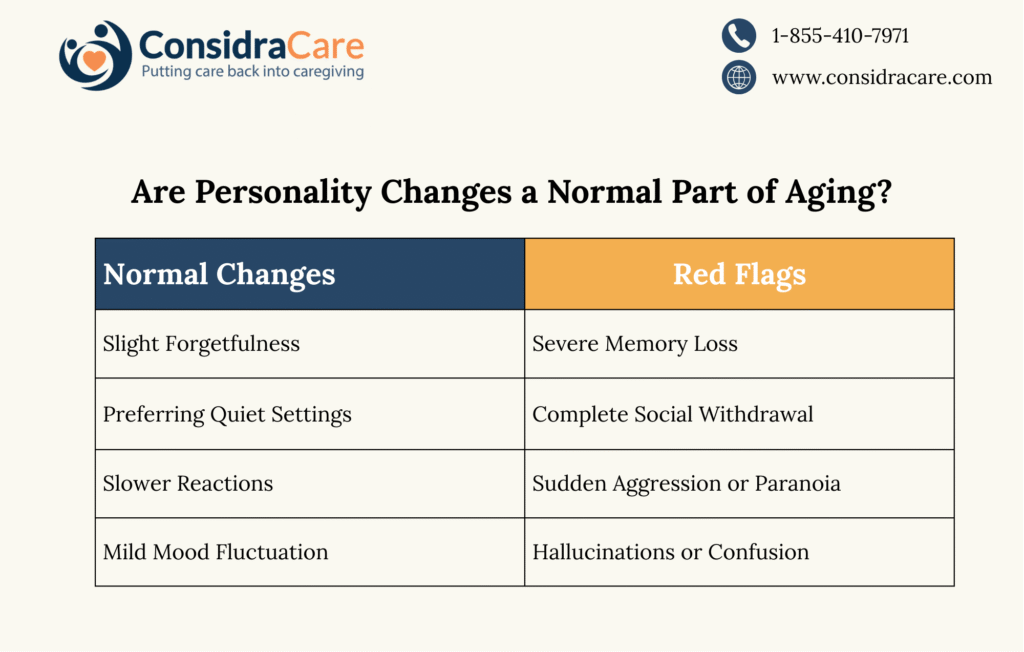You might have noticed a sudden personality change in elderly, becoming stubborn, childlike, or easily irritated. You may even find yourself asking, “They didn’t use to behave this way before; what has changed?”
There can be many reasons behind these personality changes in elderly people, and it’s important to take the time to understand them. These changes are often caused by medical conditions such as dementia, depression, infections, medication side effects, sensory impairments, or chronic illnesses. While some emotional shifts are part of normal aging, sudden or severe changes may signal an underlying health issue that requires medical attention.
In this article, I’ll walk you through what these shifts might look like. Knowing how to address these behavioral and personality changes will help you reduce stress, promote safety, and nourish your bond with your loved ones, which might get sacrificed in these challenging times.
What Can Cause Personality Changes in the Elderly?
These are the potential causes of personality or behavioral change in elders.
1. Dementia and Alzheimer’s Disease:
Conditions such as dementia and Alzheimer’s disease can cause personality changes, including agitation, confusion, aggression, anxiety, and loss of inhibition. These conditions affect brain function and memory, often leading to noticeable shifts in mood and behavior.
Symptoms to Watch For:
- Memory loss
- Repeating questions
- Disorientation
- Mood swings
When to See a Doctor?
Clear trigger indicators.
2. Depression in Older Adults:
Depression in elderly individuals can cause irritability, withdrawal, sadness, fatigue, and a lack of interest in activities. It is often linked to chronic illness, loneliness, or major life changes. Roughly 1 in 8 seniors in Canada reported experiencing depression, with higher rates observed in long-term care settings (up to 40%).
Risk Factors:
- Isolation
- Chronic Illness
- Bereavement
Treatment Options:
- Therapy
- Social Engagement
- Medication (if prescribed)
3. Hearing Loss and Communication Barriers:
We understand things better when we hear them clearly. However, in old age, hearing often becomes impaired for various reasons. When this happens, it can lead to frustration, causing your loved ones to withdraw from social gatherings and avoid visits with friends or family. Over time, they may lose interest in social interactions altogether, which can contribute to sudden personality changes in elderly individuals.
Here’s why you should pay attention to your parents’ hearing health: a real story from the community;
“My grandfather is 82 years old and experiences hearing difficulties due to his age. Whenever our relatives or friends visit, he chooses not to join them. When we asked him why, he explained: I cant hear what you guys are talking about. so, there is no use of me to sit in between.” – Ashlie Williams
This is a serious issue, especially considering the age factor. It deeply impacts their mental well-being, as supported by research. This leaves them feeling isolated even in gatherings, as they cannot actively participate in conversations.
Action Steps:
- Hearing evaluation
- Assistive devices
- Speak clearly and slowly
4. Medication Side Effects:
Some medications commonly prescribed to older adults can cause confusion, irritability, mood swings, or cognitive changes, especially when multiple drugs interact.
Common Warning Signs:
- Sudden confusion
- Agitation after dosage change
What to Do?
Manage medications effectively and consult the prescribing physician.
5. Physical Health Conditions:
Physical health issues such as strokes, chronic illnesses, neurological disorders, or changes in brain structure can have a significant impact on your parent’s personality. The burden of dealing with pain, reduced social interaction, loss of independence, and cognitive changes can take a toll on their well-being. These challenges often manifest as noticeable changes in their behavior or personality.
6. Urinary Tract Infections (UTIs):
In older adults, urinary tract infections (UTIs) can trigger delirium, causing sudden confusion, agitation, hallucinations, and mood changes. Unlike younger adults, seniors may not always show typical infection symptoms.
Urgent Signs:
- Sudden confusion
- Disorientation
- Rapid mood changes
7. Vision Problems and Hallucinations:
Vision problems such as cataracts or macular degeneration can contribute to anxiety, confusion, and even visual hallucinations, which may alter behavior in older adults. Caring for seniors with vision problems requires extreme attention and patience.
If you observe something unusual, take the time to identify and connect the cause by analyzing all the factors discussed here. The changes you notice could result from a combination of one or more causes. It’s always best to consult a doctor and openly communicate anything that concerns you.
Signs of Behavioral and Personality Changes to Watch For
Being observant helps you notice subtle things happening around you. To identify changes in your loved ones’ mood, cognition, and personality, it’s important to pay close attention. These changes may have been present for some time, but you might have overlooked them simply because you didn’t know what to watch for. Here are some key signs to keep an eye on:
- Unexpected or frequent shifts in mood, including irritability, sadness, or restlessness.
- Not engaging in social gatherings or showing hesitation to connect with others.
- Shifts in actions, such as increased impulsiveness, aggressiveness, and lack of enthusiasm.
- Struggling with memory, feeling confused, or finding it difficult to make decisions.
- Confusion about time and place.
- Accusing others of stealing something (paranoia).
- Abrupt change in eating patterns.
- Difficulty with fine motor skills.
Are Personality Changes a Normal Part of Aging?
Mild personality shifts, such as increased caution or slower decision-making, can be part of normal aging. However, sudden, severe, or disruptive behavioral changes are not typical and often indicate an underlying medical or psychological issue.

Seek immediate medical attention if personality changes are sudden, severe, accompanied by confusion, hallucinations, fever, or major behavioral shifts.
Get a Helping Hand for Caregiving!
ConsidraCare provides expert, nurse-managed in-home senior care delivered by caregivers certified in Gentle Persuasive Approaches (GPA). We focus on compassionate, respectful support that helps seniors remain safe and engaged at home. Contact us to learn how we can support your family.
Get in touch for a free assessment today!

Final Thoughts:
Human behavior gets complex with age, and understanding it requires thought and awareness of what you’re dealing with. Identifying the root of the problem is always the best approach. This will help you better understand what your loved ones are experiencing and what strategies you can use to help them navigate these behavioral and personality challenges.
Frequently Asked Questions – FAQ’s
The most commonly observed personality disorder traits in older adults are obsessive-compulsive and paranoid personality features. However, true personality disorders are less frequently diagnosed for the first time in old age. In many cases, apparent personality changes are actually caused by conditions such as dementia, depression, or medical illness rather than a new personality disorder.
Personality changes can be caused by neurological conditions (such as dementia or stroke), mental health disorders (like depression or anxiety), infections, medication side effects, chronic illness, substance use, trauma, or significant life stressors. In older adults, even minor medical issues can sometimes trigger noticeable behavioral or emotional shifts.
Signs of decline in an elderly person may include increasing memory loss, confusion about time or place, difficulty managing daily tasks, withdrawal from social activities, personality changes, frequent falls, poor hygiene, or sudden mood swings. A gradual pattern of worsening function over weeks or months often signals cognitive or physical decline.
Sudden personality changes in older adults are often caused by infections (especially urinary tract infections), medication reactions, dehydration, stroke, delirium, or metabolic imbalances. Rapid behavioral shifts are not considered a normal part of aging and should be evaluated by a healthcare professional promptly.
One of the earliest signs of cognitive decline is short-term memory loss, particularly difficulty remembering recent conversations, appointments, or newly learned information. Other early signs may include trouble finding words, misplacing items frequently, or difficulty concentrating on familiar tasks.





